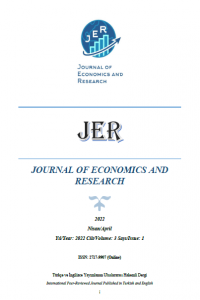Abstract
Bu çalışma Sudan'da iklim değişikliği, tarımsal üretim ve gıda güvenliği arasındaki ilişkiyi 1970-2020 arasındaki zaman serisi verilerini kullanarak incelemektedir. Çalışmada yapısal kırılmalı birim kök testleri ve sınır testi ile eşbütünleşme yaklaşımı uygulanmaktadır. Tahmin edilen modeller, yağışın mahsul ve hayvancılık üretimi üzerindeki etkisinin olumlu olmasına rağmen, gıda güvenliğinin iklim değişikliğinden yağış açısından doğrudan olumsuz etkilendiğini göstermektedir. Enerji kullanımı ve GSYİH büyümesi gıda güvenliğini olumlu etkilerken, gıda fiyatları, döviz kuru, gıda ithalatı ve dış yardımların olumsuz etkileri bulunmaktadır. Artan CO2 emisyonu gıda güvenliğini olumlu yönde doğrudan, GSYİH büyümesini ise olumlu yönde dolaylı olarak etkilemektedir. Bununla birlikte, enerji kullanımının gıda güvenliği üzerindeki olumlu etkisi, enerji kullanımının GSYİH büyümesi üzerindeki olumsuz etkisi ile neredeyse dengelenmektedir. Kukla değişkenler tarafından açıklanan yapısal kırılmaların gıda güvenliği üzerinde hiçbir etkisi bulunmamaktadır. Toplu olarak değerlendirildiğinde bu bulgular, Sudan'da gıda güvenliğinin belirleyicileri olarak iklim değişikliği ve ekonomik faktörlerin etkileşimlerinin karmaşıklığını göstermektedir. Çalışmada, gıda güvenliğinin kısa vadeli hava dalgalanmalarından ziyade uzun vadeli bir fenomen olarak iklim değişikliğinden etkilendiği sonucuna varılmıştır.
References
- David Keen and Vivian Lee (2007) Conflict, trade and the medium-term future of food security in Sudan, Disasters, Volume 31, Issue 1, Special Issue: Food Security in Sudan, March 2007, Pages S9-S24.
- Naseem, S., Guang Ji, T. & Kashif, U. Asymmetrical ARDL correlation between fossil fuel energy, food security, and carbon emission: providing fresh information from Pakistan. Environ Sci Pollut Res 27, 31369-31382 (2020). https://doi.org/10.1007/s11356-020-09346-3
Abstract
This study investigates the nexus between climate change, agricultural production and food security and food security in Sudan, utilizing time series data over the period 1970 to 2020. The study applies unit root tests with structural breaks and the bounds test cointegration approach. The estimated models show that food security is directly negatively affected by climate change in terms of rainfall, although the effect of rainfall is positive on crop and livestock production. Energy use and GDP growth have positive effect on food security while food prices, exchange rate, food imports and foreign aid have negative effects. CO2 emissions affect food security positively through their positive effect on GDP growth. However, the positive effect of energy use on food security is almost offset by a negative effect of energy use on GDP growth. Meanwhile, a positive effect of agricultural production on GDP growth is found to partially mitigate the negative effect of rainfall and CO2 emissions on food security. Structural breaks accounted for by dummy variables have no effects on food security. In the short run, CO2 emissions and foreign aid affect food security negatively, while food prices and exchange rate have positive effects. On the other hand, food insecurity is found to have negative effects on agricultural production and GDP growth. Collectively these findings indicate the complexity of interactions of climate changes and economic factors as determinants of food security in Sudan. The study concludes that food security is affected by climate change as a long term phenomenon rather than by short run weather fluctuations. Long term economic growth is necessary for food security and should be enhanced, together with policies enhancing agricultural production in face of adverse climate effects. The study argues for transforming foreign aid from humanitarian-crisis focused to planned development projects for adaptation to climate changes including water harvest projects, and for income generating activities in Sudan.
References
- David Keen and Vivian Lee (2007) Conflict, trade and the medium-term future of food security in Sudan, Disasters, Volume 31, Issue 1, Special Issue: Food Security in Sudan, March 2007, Pages S9-S24.
- Naseem, S., Guang Ji, T. & Kashif, U. Asymmetrical ARDL correlation between fossil fuel energy, food security, and carbon emission: providing fresh information from Pakistan. Environ Sci Pollut Res 27, 31369-31382 (2020). https://doi.org/10.1007/s11356-020-09346-3
Details
| Primary Language | English |
|---|---|
| Subjects | Economics |
| Journal Section | Research Articles |
| Authors | |
| Early Pub Date | April 20, 2022 |
| Publication Date | April 20, 2022 |
| Published in Issue | Year 2022 Volume: 3 Issue: 1 |


